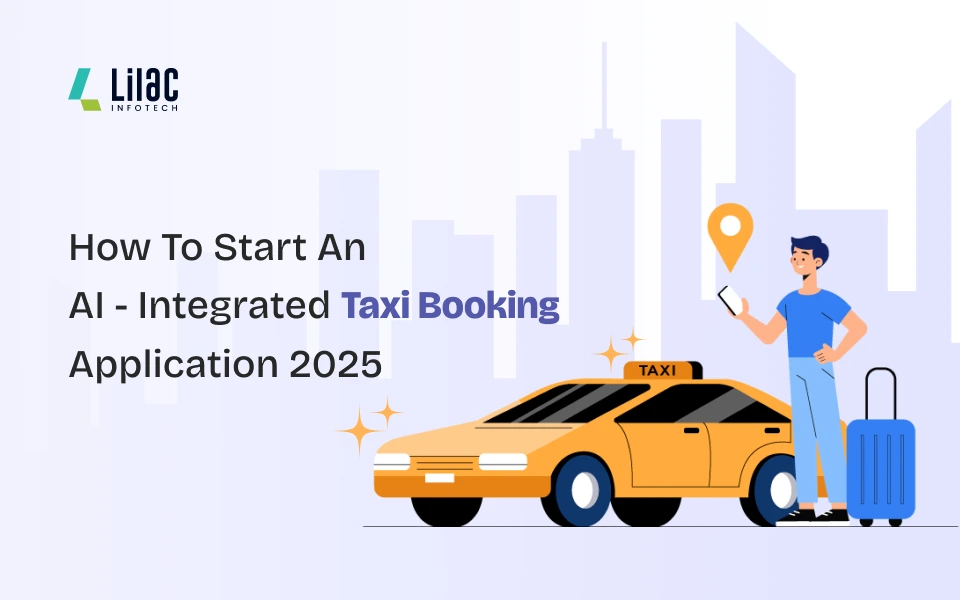
A few years ago, getting a safe, personalized ride with contactless payments and affordable fares seemed futuristic. Today, these are standard expectations for any taxi booking app. The credit for this evolution goes to the rise of Artificial Intelligence (AI) and Machine Learning (ML), which are completely transforming how ride-hailing apps are developed and experienced. If you’re wondering just how profitable a taxi app can be, consider this: the global taxi app market is projected to hit $283 billion by 2028, and from 2024 to 2028, the number of users in this industry will grow by over 217 million.
Impressive, right?
These stats reveal that the taxi ride-hailing segment is booming, especially in the Middle East and North America. Giants like Uber, Left, and Career are proof of the model’s success. But what’s driving the next big wave? The answer: AI-powered taxi app development. These smart systems are turning regular ride-hailing apps into highly profitable and user-centric platforms. Let’s explore how AI is revolutionizing the taxi app development landscape.
1. Enhanced Efficiency & Convenience
AI optimizes core ride-hailing functionalities:
Surge Pricing Management: AI anticipates high-demand periods and dynamically adjusts fares for fairness and transparency.
Personalized Rides: AI understands user preferences—whether it’s a specific car type, music, or temperature—creating a more tailored experience.
2. Real-Time Data for Smart Decisions
An experienced taxi booking app development company integrates AI/ML tools to manage:
Traffic congestion
Travel time predictions
Weather conditions
Real-time analytics empower users to know availability, expected delays, and even the demand-to-supply ratio in their area.
3. Customization That Boosts Loyalty
AI delivers ultra-personalized experiences by analyzing:
Past bookings
Favorite routes
Ride frequency
This data helps the app suggest optimal deals, personalized routes, and even nearby points of interest like restaurants. These small touches significantly increase customer retention.
4. Fraud Detection & Security
AI and ML algorithms enhance platform safety by:
Detecting suspicious booking behavior
Monitoring for patterns like booking multiple rides at once
Automatically flagging and responding to potential fraud
This adds an essential layer of trust for both drivers and passengers.
5. Predictive Vehicle Maintenance
AI doesn’t just improve the user experience—it helps drivers too:
Monitors vehicle health
Detects performance issues early
Prevents unexpected breakdowns
This predictive approach keeps fleets running efficiently and reduces downtime.
6. Driver Performance Management
AI evaluates driver performance by analyzing:
Speed and braking habits
Route adherence
Customer feedback
The system can offer actionable insights to help drivers improve safety and efficiency, creating a better overall service.
7. Smarter Pricing With Dynamic Algorithms
AI-based dynamic pricing models factor in:
Time of day
Location
Local events
Weather and traffic
This allows for fairer pricing for riders and better compensation for drivers, keeping both sides happy.
8. Intelligent Route Optimization
Using historical data and real-time road updates, AI determines:
The fastest and most fuel-efficient routes
Alternate paths during peak traffic or roadblocks
This saves time, lowers fuel costs, and provides more accurate ETAs.
9. AI-Powered Chatbots for Support
Modern taxi apps now come with smart chatbots that:
Answer queries instantly
Learn from past interactions
Offer 24/7 support
This enhances user satisfaction by solving issues quickly without needing human intervention.
10. Seamless Integrated Payment Systems
To offer a smooth checkout experience, AI-integrated apps support:
UPI
Wallets
Debit/Credit cards
Net banking
It ensures secure and convenient transactions, reducing cart abandonment and delays.
11. Precision with Estimated Time of Arrival (ETA)
With AI-driven GPS and real-time data:
Users receive accurate ETAs
Notifications update based on traffic/weather
Delays are proactively communicated
This builds reliability and trust in the service.
12. Voice and Smart Assistance
AI introduces hands-free convenience:
Voice-activated ride booking
Real-time navigation updates
Auto-fare calculation
This makes the ride-booking process easier for everyone—especially on the go.
13. Building a Future-Proof Industry
AI is driving long-term innovation in multiple ways:
Sustainability: Optimized routes lower fuel use and reduce carbon emissions.
Autonomous Vehicles: Self-driving tech, powered by AI, is reshaping the transport landscape.
Multi modal Transport Integration: AI makes it possible to blend services like taxis, bikes, and e-scooters into one seamless app.
14. Support for Smart City Goals
AI-powered taxi apps play a role in smart city planning by:
Syncing with urban infrastructure
Helping optimize energy and traffic flow
Offering valuable data for city management
This makes them integral to future urban mobility systems.
How to Build a Taxi Booking App: A Simple 5-Step Guide

Creating a successful taxi booking app requires strategy, user understanding, and the right tech partner. Here’s a simplified five-step process to get you started:
1. Research & Planning
Understand Your Market: Analyze competitors, identify user pain points, and study current trends.
Define Your UVP: Offer something unique—affordable rates, green rides, or luxury features.
2. Design & User Experience
Prototyping: Use tools like Figma or Adobe XD to design and test user flows.
User-Centric Design: Make the app simple, accessible, and quick to use—even for specially-abled users.
3. Development & Testing
Agile Approach: Build in sprints for flexibility and faster delivery.
Tech Stack: Use Flutter (cross-platform) and Node.js (backend).
Quality Testing: Run functional, UAT, and network condition tests.
4. Launch & Promote
Marketing Strategy: Use social media, ads, and referral programs.
App Store Optimization (ASO): Optimize listings with keywords, screenshots, and descriptions.
User Feedback: Gather reviews post-launch for improvement.
5. Improve & Grow
Iterate Constantly: Update features based on user feedback.
Scale Smartly: Optimize servers and code as your user base grows.
Expand: Enter new markets or add services (like carpooling or bike taxis).
Why Choose AI for Taxi App Development?
AI transforms ride-hailing apps with:
Accurate ETAs
Personalized rides
Predictive pricing
Fraud detection
Route optimization
Smart support bots
Multilingual interfaces
Sustainability improvements
Conclusion
AI is revolutionising the ride-hailing industry. If you’re ready to build a scalable, feature-rich taxi booking app, now is the time. Partner with a trusted taxi booking app development company to bring your vision to life and stay ahead of the curve. Build your next-gen taxi booking app with Lilac Infotech, a trusted name in mobile app development.



















Fantastic and forward-thinking guide on launching an AI-integrated <a href="https://analogueitsolutions.com/">taxi booking application</a>! The way you break down how AI enhances features like dynamic pricing, accurate ETAs, real-time traffic analytics, and even predictive vehicle health is both comprehensive and inspiring. The 5-step roadmap offers a clear path that’s incredibly helpful.